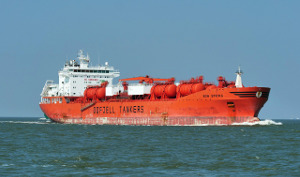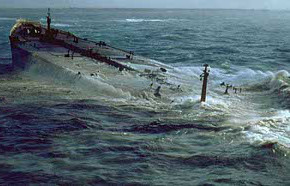Maritime disasters: prevention and control
Maritime disasters: Preventive measures
 The maritime disasters prevention goes through a long-term prospective work entrusted to the competent authorities in terms of land use and ports management.
The maritime disasters prevention goes through a long-term prospective work entrusted to the competent authorities in terms of land use and ports management.
Marine security is keen on adopting air traffic control methods, yet, it does not have the required resources for the time being. One of the hardships is the proper management of hazardous material transport (HMT).
Risk prediction is carried out through various means:
- the radar and satellite monitoring of navigation
- material progress associated to meteorological forecast and the good training of staff members
- the withdrawal of ships which are no longer in a state of navigation
- a better coordination of surveillance means, sea and rescue police
- the prevention of pollution risks goes also through the knowledge of risks and of the vulnerability of marine and shore ecosystems
Read also | Maritime gigantism
Regulation of marine navigation to alleviate the risk of maritime disasters
With the development of marine transport business, the international community has been endowed with a sector-governing apparatus. Due to their gravity, some disasters have pushed the states to adopt specific legislations so as to meet new requirements.
 The Amoco Cadiz ran aground off the coast of Brittany, France on March 16, 1978, spilling 68.7 million gallons of oil The Amoco Cadiz ran aground off the coast of Brittany, France on March 16, 1978, spilling 68.7 million gallons of oil |
Set up in 1948 by the United Nations organisation, the International Maritime Organisation (IMO) was the first body to devise a legal framework governing sea safety. IMO has adopted about forty conventions and protocols and more than 800 collections of rules, codes and recommendations pertaining to maritime safety, pollution prevention and other related issues.
Among these measures adopted to alleviate the risk of maritime disasters, two conventions setting the rules of hydrocarbons marine transport:
- The MARPOL convention (1973) that particularly regulates degasification operations.
- The SOLAS convention (1974) that defines safety standards and related responsibilities.
Following the oil slick triggered by the wreck of Amoco-Cadiz, France set up, in 1979, the “Centre de Documentation de Recherche et d'expérimentations sur les Pollutions Accidentelles des Eaux (CEDRE)” (the Documentation center for research and Experiments on Accidental Pollution of Water), an entity that conducts expertise, risks audit, training, and which takes part in the fight against pollution and in the elaboration of international intervention plans.
A group of particularly-exposed European countries put in place an Information System Related to Monitored Ships (SIRENAC), a data base which keeps track of ships' inspections of the 19 states signatory of the Paris Memorandum (December 1980).
Maritime disasters: Ships’ oversight measures
The black series of maritime disasters has pushed the states to impose stiffer legislations on the transport of oil and hazardous material. Measures provide for tighter control, ship monitoring, position notification and most importantly, the requirement of a double hull for oil tankers.
Following the Erika wreck, the European Commission adopted in 1999 a series of measures, the so-called Erika “paquets” (packages):
- Erika I: Aims at controlling the ships' conditions. It also provides for the ban of single-hulled ships by latest 2015.
- Erika II: Apart from the maritime safety agency in charge of assessing control procedures for ships, the measure provides for the creation of a damage-indemnification fund.
- Erika III: The measure was debated in 2006 and will undoubtedly be considered in the second semester of 2008.
Maritime disasters: Deterrent measures
States are strengthening sanctions and control tools against those they characterizes as “sea thugs”:
- heavy fines for hydrocarbon wastes or maintenance and safety failures
- a stricter control of classification companies
- the double-hull requirement
- assistance systems for radar, anti-explosion checking
- redundancy of the mechanic and security systems
- expulsion from all ports of all ships over 15 years of age and which have been immobilized more than twice in the recent two years
- setting up a data base on ships safety
Read also | The most famous shipwrecks